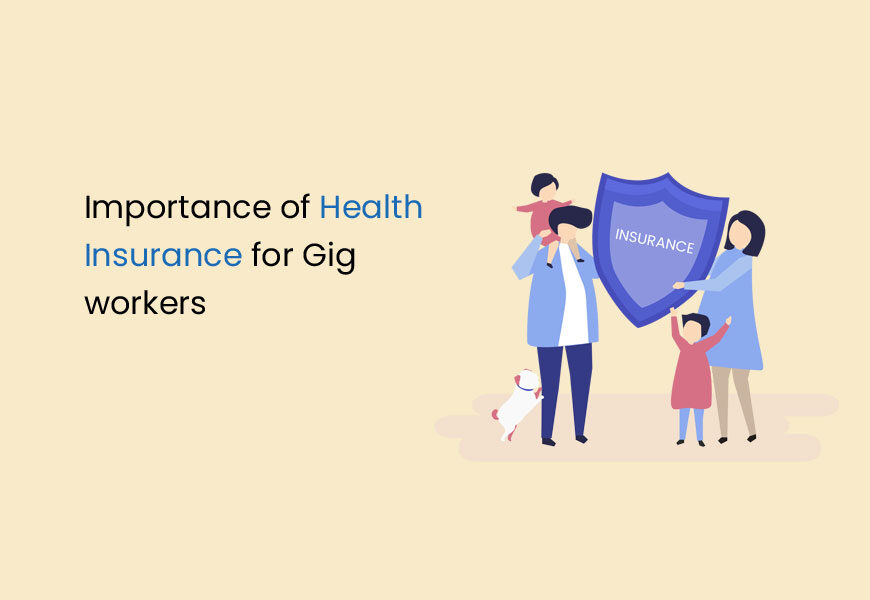The Covid-19 pandemic has shone a harsh light on the poor accessibility and affordability of preventive and curative medical care for a vast section of the global population. It has also highlighted how useful health insurance is/ could have been to a vast majority of the population in India and the globe.
Healthcare is expensive, often with prohibitively high costs that can push people into poverty. In fact, one-third of the global population don’t have access to even essential health services. More than a billion people spend at least 10% of their household budget on out-of-pocket medical expenditure. Half a billion people are either pushed or pushed deeper into extreme poverty owing to their medical bills paid out of pocket.
Health insurance provides financial protection for individuals and families against the high cost of medical care. It is particularly more critical to the fast-growing base of gig workers. Why is it so? Keep reading to find out.
An Overview About the Gig Economy
The gig economy refers to a labour market in which temporary, short-term, or freelance positions are prevalent, rather than permanent jobs. Gig workers are individuals who work in short-term or freelance positions, typically in the gig economy. They are employed transactionally by employers which include small business, tech-enabled businesses, corporates, etc. Gig workers typically work for multiple clients or companies on a project-by-project basis, and their work is often facilitated through digital platforms or mobile apps.
Types of Gig Workers
Gig workers are typically categorized based on the level of skills needed into
- High-skilled workers with specialized skills and knowledge in a particular field such as freelancers, consultants, independent contractors, etc. in software development, graphic design, accounting and so on.
- Semi-skilled workers who have some level of training or education but may not have specialized skills. They typically work in industries such as retail, food service, and hospitality. For instance, telecallers, LIC agents, etc.
- Unskilled or low-skilled workers who do not have specialized skills or training and work in low-wage jobs such as driving for ride-sharing companies, delivering food or packages, or performing manual labour tasks.
In India, 47% of gig workers have medium skill level, 31% have low skill level and 22% have specialized skills.
The Gig Economy in India
The gig economy is growing at an accelerated pace, in India and the world. India approximately has 15 million gig workers at present. Currently generating 56% of India’s new non-farm employment, the gig economy holds the potential to add 90 million more jobs over the next 8-10 years and an additional 1.25% to the GDP over the long run.
Gig work isn’t a new concept in India where 93% of the workforce is in informal employment. However, it has definitely gained momentum with the accelerated pace of digital transformation, globalization and urbanization. These have created an upsurge in the demand for and the success of e-commerce and app-based technology platforms. Given the flexibility, convenience and comfort offered by these apps and platforms, we are seeing a marked shift in consumer behaviour in their favour.
The Benefits and Challenges of Gig Work
For employees, it offers flexibility and freedom to take up multiple hustles and maximize their earnings, without being tied to a single employer. They are able to more easily find gigs owing to the increasing demand and changing employment models.
Owing to the success of tech-enabled platforms, there is also a growing demand for gig workers among employers, especially in the startup and tech-platform sectors. Plus, this new employment model is favourable to employers too as they can engage in flexi-hiring, fill their talent gaps more seamlessly, adjust headcounts as per need, access niche skills without hiring full-time specialists and much more.
All the positives aside, one of the biggest concerns regarding the shift towards and the growth of the gig economy is the lack of basic rights and social security benefits. In India, 95.3% of gig workers don’t have access to any social security benefits, be it – health insurance, retirement benefits, disablement benefits, maternity benefits and so on. The lack of healthcare insurance and medical benefits is particularly concerning.
The other major challenges faced by gig workers include:
- The lack of a steady source of income since their services are mostly employed on-demand.
- They are outside the purview of most legislations. So, they do not have any legal respite.
- They are often termed as partners by corporate employers instead of workers. So, they are not entitled to any social security or other benefits.
- They do not have any safety net or protection in case of emergencies, natural disasters or other socio-economic eventualities.
Importance of Health Insurance for Gig Workers
Offers a Much-Needed Safety Net
Health insurance is a type of insurance policy that provides coverage for medical and surgical expenses incurred by an individual or a group. Health insurance policies can be purchased by individuals, families, or employers to help pay for the cost of healthcare services, such as doctor visits, hospital stays, prescription drugs, and medical tests.
Health insurance policies vary in their coverage levels and cost, and may be provided by private insurance companies, government-sponsored programs, or a combination of both. Often, employers provide health insurance to their formal employees as an employee benefit, whether or not they are mandated by law.
Self-employed individuals, however, need to purchase health insurance coverage for themselves and their families, as they do not have access to employer-sponsored health insurance. Self-employed health insurance can be purchased through insurance agents, brokers or through online insure-tech platforms.
Most health plans require individuals to pay a premium, which is a regular payment made to the insurance company, in exchange for coverage. Some policies also require a deductible, which is an amount that the policyholder must pay before the insurance company begins covering medical expenses. The specific terms and conditions of a health insurance policy will depend on the type of policy and the insurance provider.
Health insurance offers a much-needed safety net to gig workers and their families as they can access good quality, cash-free medical care. Even when the policy does not provide cash-free benefits, they will still be reimbursed for the medical expenses through the claims process. This way, they will not fall into a debt trap and will have a reliable source of savings for their health expenses.
Protect Their Health and Well-Being with Access to Timely Healthcare
Medical expenses can add up quickly, especially in cases of serious illness or injury. For example, the cost of hospitalization, surgery, medication, rehabilitation and other treatments can easily reach several thousands and lakhs for gig workers who are required to engage in heavy physical labour. Without health insurance, individuals may be unable to afford necessary medical care or may go into debt trying to pay for it.
Additionally, health insurance can help gig workers access preventive care and early treatment, which can help detect and manage health conditions before they become more serious and expensive to treat. Overall, this helps to improve health outcomes in the long-run and ensure a healthier population.
Schemes like the ESI in India also provide comprehensive maternity benefits to women. The scheme offers benefits not just to biological mothers, but adoptive mothers, women who have pregnancy complications, miscarriages, etc. The instances of maternal and infant mortality will reduce as women get access to safe deliveries and pre- and post-natal care.
Reduced Out-of-Pocket Expenses and Greater Savings
Health insurance reduces the out-of-pocket expenses for gig workers and enables them to save more, diverting their income into other important activities and needs such as house repairs, children’s education, skill training, etc.
Some health insurance policies like the ESI scheme offer access to cash-free medical aid without an upper limit on expenditure at ESI clinics/ hospitals along with a host of other benefits. Such policies will enable gig workers, especially those with meagre means and who are vulnerable to falling into poverty, to access healthcare in a timely fashion, without having to bother about arranging finances or accessing low-quality health providers.
Financial Security
Gig workers, especially those in low-skill, low-income jobs, are faced with financial insecurity as they don’t have a regular source of income. They earn as long as there is demand for their services and they are able to show up for work. If they want to earn more, they need to spend more hours or take on multiple hustles. Further, they are vulnerable to economic fluctuations especially during events like the pandemic or a natural disaster.
As a result, they may not be able to pay out-of-pocket for medical aid if they lose a job or can’t find enough work. These types of workers may be exposed to different risks in their line of work, making it all the more important to have a safety net in place.
Health insurance covers the cost of expensive medical treatments and protects against the financial burden of illness or injury. In the absence of regular income, health benefits and insurance can help cover medical expenses for themselves and their dependents, which can often consume a significant portion of their savings.
Disablement & Survivorship Benefits That Protect Them and Their Families
Gig workers face a high risk of disablement, injuries and occupational diseases owing to the nature of their work. For instance, drivers, delivery workers, etc. work long hours (sometimes 16-20 hours) without rest, proper nourishment and inhumane conditions, engaging in heavy manual labour. This causes a higher risk of accidents, ill health and diseases like liver issues, constipation, neck and back pain, wrist pain, fatigue and so on.
Without health insurance, their families will be pushed/ pushed deeper into extreme poverty. Health plans such as the government-initiated ESI scheme provide not just comprehensive health cover to workers and their families, but also provide disablement benefits (including compensation, skill training and rehabilitation), survivorship benefits (including monthly pensions to dependents and funeral expenses), confinement benefits and much more. This is important for low- and medium-skill gig workers who are at a higher risk of occupational diseases and injuries.
Brings Equity in Healthcare Access
As we had mentioned in one of the previous sections, over 95% of gig workers in India don’t have access to any social security benefits. By providing access to health insurance, employers can ensure equitable access to healthcare to all.
Security In the Face of Rising Medical Inflation
Medical inflation is a reality and gig workers may not be able to afford medical treatments in the face of rising medical costs. With health insurance, gig workers and their families can still access quality healthcare including expensive treatments, medications, imaging, etc. Government health plans such as the ESI scheme make medical care accessible and affordable to vast sections to the population.
Click Here For : What Is health Insurance
Benefits For Employers
Providing healthcare benefits to gig workers brings several benefits to employers including:
- Improved productivity and output
- Lower absenteeism
- Greater loyalty
- Nurturing trusting, long-term relationships with workers
- Lower attrition and better retention
- Ability to attract talented workers and much more.
Some Real-Life Incidents
A simple online search would reveal several real-life incidents of how food delivery partners and drivers for tech-enabled platforms suffered during the pandemic. Despite the risk of infections, they were forced to work to make ends meet as they were sole or primary breadwinners of their families. Being exposed to the Covid infection, several of them lost their lives. Their families with several dependents were left to fend for themselves with no source of income. With health insurance, these families would have had access to timely medical care, insurance and survivorship benefits.
The Way Forward
Health insurance makes quality, timely healthcare accessible to everyone. It is particularly important for gig workers as they face a higher risk of workplace injuries and occupational diseases. Further, it will provide them with a sense of financial security especially in the face of rising medical costs.
Given the criticality, how can you make health insurance accessible to gig workers?
With the TankhaPay app, employers can make the comprehensive benefits of the Employees’ State Insurance (ESI) Scheme accessible to all their gig workers. It will be a marginal addition to their costs but will offer multiplier benefits to employees and employers.
Download the app now and make quality medical care and other benefits accessible to your gig workers.














